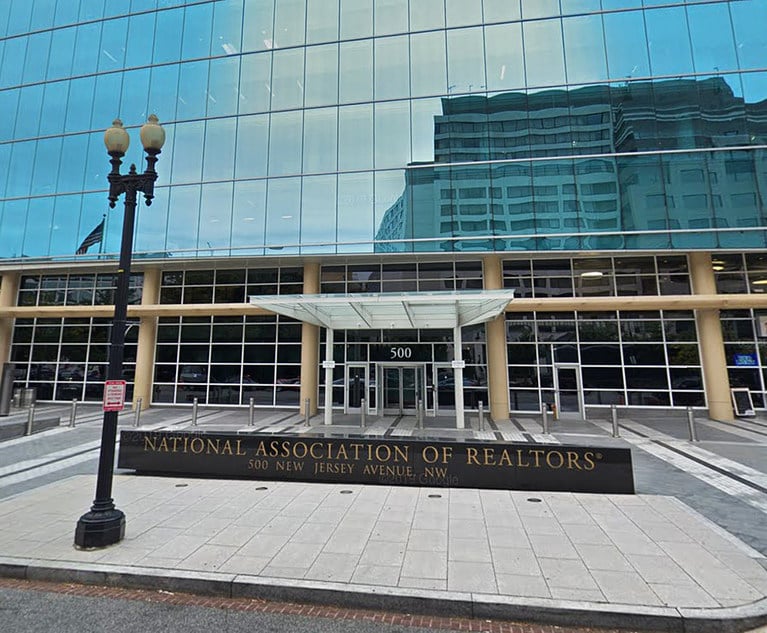Daily Dicta: Stinky? Yes. A Public Nuisance? No. Beveridge Litigators Stick Up for Landfills
A growing number of plaintiffs around the country are attempting to bring public nuisance class actions against landfills because—as garbage is want to do—the sites stink.
March 20, 2019 at 01:51 PM
4 minute read
 A friend of mine has a 15-year-old daughter who is beseeching her parents to commit to going zero-waste.
A friend of mine has a 15-year-old daughter who is beseeching her parents to commit to going zero-waste.
That is, to produce no trash, instead composting, recycling and re-using everything.
It's a laudable example of conscientious youth until you start thinking about the logistics: What are you supposed to do for shampoo? Deodorant? Do you have time to make your own hummus and cream cheese and yogurt and everything else that's normally sold in plastic containers or wrapped in plastic (i.e. everything)?
Suffice to say, zero waste isn't easy.
As for the rest of us trash-producing mortals, we still need landfills. Which is why I don't have much sympathy for a growing number of plaintiffs around the country attempting to bring public nuisance class actions against landfills because—as garbage is want to do—the sites stink.
Last week, litigators from Beveridge & Diamond racked up five defense wins on behalf of landfills in Pennsylvania and Louisiana that were hit with public nuisance suits for emitting noxious odors.
 Beveridge principal James Slaughter said the jump in landfill suits may have been triggered by successful public nuisance cases against smelly hog farms. In April of 2018, for example, neighbors near a 15,000 acre hog farm in North Carolina won a $50 million jury verdict against Smithfield Foods.
Beveridge principal James Slaughter said the jump in landfill suits may have been triggered by successful public nuisance cases against smelly hog farms. In April of 2018, for example, neighbors near a 15,000 acre hog farm in North Carolina won a $50 million jury verdict against Smithfield Foods.
Two months later, another North Carolina jury awarded $25 million in a similar public nuisance case against Smithfield.
But landfills are “very different facilities,” Slaughter said. “They're a critical part of the public infrastructure. They're stationary. They tend to exist in the same location for many decades. It's a very different set of facts and legal circumstances, especially given how heavily they're regulated at the federal and state level.”
The plaintiffs who sued Bethlehem Landfill Co. in Bethlehem, Pennsylvania on behalf of 8,400 homeowners, for example, did acknowledge that decomposing garbage “inherently generates odors.”
But in their complaint filed in U.S. District Court for the Eastern District of Pennsylvania, they asserted that more could be done to minimize the stench, and that they were entitled to compensatory and punitive damages, plus injunctive relief so that odors “no longer invade plaintiffs' property.”
But U.S. District Judge Chad Kenney last week dismissed the suit, ruling that the homeowners failed to state a viable claim for a public or private nuisance, nor could they show that the landfill was negligent.
Yes, he noted, an improperly maintained, extra-stinky landfill could be considered a public nuisance. But Kenney wrote that the plaintiffs “fail to allege a private action for this public nuisance because they do not show how their injury is over and above the injury suffered by public generally.”
The landfill is permitted and regulated by the Pennsylvania Department of Environmental Protection, which over the years has periodically cracked down on the facility when it hasn't toed the line. It's already got an active overseer to make sure it's following the law.
“Plaintiffs seem to assume that, because they have alleged that their property is filled with odors from defendant landfill, they suffer an injury of greater magnitude as compared to the 'general public,'” the judge continued. “Plaintiffs' proximity alone, which again would necessarily require that thousands of other households also have a special harm, does not demonstrate how plaintiffs are uniquely harmed by defendant landfill over and above the general public.”
In other words, too bad.
Moreover, he ruled that the negligence claim failed because the plaintiffs could not identify a duty by the landfill to prevent offsite odors.
In addition to Slaughter, the Beveridge team also included partners Megan Brillault and Michael Murphy, plus John Paul, Nicole Weinstein and Roy Prather. Robert Donchez of Florio Perrucci Steinhardt & Cappelli was local counsel in Pennsylvania.
The landowners were represented by Kevin Riechelson of Kamensky, Cohen & Riechelson in Trenton, New Jersey, who did not respond to a request for comment.
This content has been archived. It is available through our partners, LexisNexis® and Bloomberg Law.
To view this content, please continue to their sites.
Not a Lexis Subscriber?
Subscribe Now
Not a Bloomberg Law Subscriber?
Subscribe Now
NOT FOR REPRINT
© 2025 ALM Global, LLC, All Rights Reserved. Request academic re-use from www.copyright.com. All other uses, submit a request to [email protected]. For more information visit Asset & Logo Licensing.
You Might Like
View All
Latham's 7-Year Fight to Reshape New York City Property Taxes

Litigators of the Week: Plaintiffs Reach a $418M Market-Shifting Settlement With Realtor Group

How This Kirkland Partner Pushed Past a Flat Tire and Glitchy Tech to Deliver a Winning Argument for Sotheby's

Litigators of the Week: Trump Org Prosecutors Secure Across-the-Board Guilty Verdict in Tax Fraud Trial
Trending Stories
- 1Uber Files RICO Suit Against Plaintiff-Side Firms Alleging Fraudulent Injury Claims
- 2The Law Firm Disrupted: Scrutinizing the Elephant More Than the Mouse
- 3Inherent Diminished Value Damages Unavailable to 3rd-Party Claimants, Court Says
- 4Pa. Defense Firm Sued by Client Over Ex-Eagles Player's $43.5M Med Mal Win
- 5Losses Mount at Morris Manning, but Departing Ex-Chair Stays Bullish About His Old Firm's Future
Who Got The Work
J. Brugh Lower of Gibbons has entered an appearance for industrial equipment supplier Devco Corporation in a pending trademark infringement lawsuit. The suit, accusing the defendant of selling knock-off Graco products, was filed Dec. 18 in New Jersey District Court by Rivkin Radler on behalf of Graco Inc. and Graco Minnesota. The case, assigned to U.S. District Judge Zahid N. Quraishi, is 3:24-cv-11294, Graco Inc. et al v. Devco Corporation.
Who Got The Work
Rebecca Maller-Stein and Kent A. Yalowitz of Arnold & Porter Kaye Scholer have entered their appearances for Hanaco Venture Capital and its executives, Lior Prosor and David Frankel, in a pending securities lawsuit. The action, filed on Dec. 24 in New York Southern District Court by Zell, Aron & Co. on behalf of Goldeneye Advisors, accuses the defendants of negligently and fraudulently managing the plaintiff's $1 million investment. The case, assigned to U.S. District Judge Vernon S. Broderick, is 1:24-cv-09918, Goldeneye Advisors, LLC v. Hanaco Venture Capital, Ltd. et al.
Who Got The Work
Attorneys from A&O Shearman has stepped in as defense counsel for Toronto-Dominion Bank and other defendants in a pending securities class action. The suit, filed Dec. 11 in New York Southern District Court by Bleichmar Fonti & Auld, accuses the defendants of concealing the bank's 'pervasive' deficiencies in regards to its compliance with the Bank Secrecy Act and the quality of its anti-money laundering controls. The case, assigned to U.S. District Judge Arun Subramanian, is 1:24-cv-09445, Gonzalez v. The Toronto-Dominion Bank et al.
Who Got The Work
Crown Castle International, a Pennsylvania company providing shared communications infrastructure, has turned to Luke D. Wolf of Gordon Rees Scully Mansukhani to fend off a pending breach-of-contract lawsuit. The court action, filed Nov. 25 in Michigan Eastern District Court by Hooper Hathaway PC on behalf of The Town Residences LLC, accuses Crown Castle of failing to transfer approximately $30,000 in utility payments from T-Mobile in breach of a roof-top lease and assignment agreement. The case, assigned to U.S. District Judge Susan K. Declercq, is 2:24-cv-13131, The Town Residences LLC v. T-Mobile US, Inc. et al.
Who Got The Work
Wilfred P. Coronato and Daniel M. Schwartz of McCarter & English have stepped in as defense counsel to Electrolux Home Products Inc. in a pending product liability lawsuit. The court action, filed Nov. 26 in New York Eastern District Court by Poulos Lopiccolo PC and Nagel Rice LLP on behalf of David Stern, alleges that the defendant's refrigerators’ drawers and shelving repeatedly break and fall apart within months after purchase. The case, assigned to U.S. District Judge Joan M. Azrack, is 2:24-cv-08204, Stern v. Electrolux Home Products, Inc.
Featured Firms
Law Offices of Gary Martin Hays & Associates, P.C.
(470) 294-1674
Law Offices of Mark E. Salomone
(857) 444-6468
Smith & Hassler
(713) 739-1250






